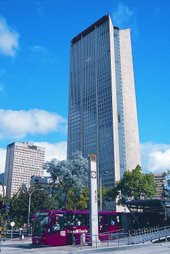
Sweden is today one of the richest and prosperous countries in the world. It has developed a solid, specialized and highly diversified economy, combined with an efficient and rational use of its natural resources. Nevertheless this was not always like that; during many centuries Sweden was poor, agricultural and had an illiterate population. The country that shines today lived many decades in hunger, darkness and isolation. Despite this past, Sweden breaks all forecasts and even its history.
The development of the Swedish industry takes place in the 19th century, when in some regions of the country a process of industrialization started encouraged by the wood industry and, later on, by the production of cellulose for paper manufacturing. However, it was in the middle of the 20th century, and after the Second World War, when the Swedish industry achieved it highest level of development and expansion. Recognized companies of today like Volvo, Alfa Laval and Ericsson, that initially were small and local, were able to transform in multinationals that compete globally with advanced, trustable and sophisticated products, technical solutions and services.
This Swedish miracle can be ascribed to the combination of various factors, among which we can highlight: the human resources, the capital and the active and efficient participation of the Government. These three factors allowed the transition from an undeveloped country to a modern and rich society.
Sweden offers its citizens a high quality of life, welfare and a clean environment. In Colombian terms, it is a good “vividero”. There are around 9 million Swedes, including the immigrant citizens and those with immigrant origins. Many Swedes are highly skilled, productive and bilingual or with some knowledge in other languages such as English, German and, recently, Spanish. Many Swedes have developed skills for practical tasks, design and technology. Swedes have a great interest and curiosity for the world, travel and different cultures. Moreover, they share a great passion for nature and sports.
Swedes are demanding consumers. They are used to read, compare, check and analyze the products they buy. In some cases their economic decisions are influenced by ethical criteria, like for instance the care and protection of the environment, the justice and social equity in the production, or the fair salary levels. These values go beyond the cost-benefit traditional logic, and make more challenging, but at the same time intelligent and profitable, the competition in this market.
From any angle that you want to see it, Sweden offers interesting opportunities for Colombians. From the commercial point of view, this country has ports strategically located on the west coast, like Gothenburg, which can be potentially used for the entrance and distribution of Colombian products to the Nordic market. Technologically, the country is a clear example of development, application and constant innovation of IT solutions, telecommunications and other modern technologies. Concerning education, most universities and institutes are subsidized and compete in an international level. Regarding ethical criteria and values, base and guidance of the Swedish society, Sweden has not only preached but practiced values like solidarity, equity, respect, dignity and freedom of expression, among others.
To be able to have an active participation in this market, full with great opportunities, it is necessary to know more about Sweden and the Nordic market, its business culture, rules, etc. To contribute on this task, the CCCS, established in Stockholm, have available other documents and analysis that without any doubt will be of great help to your future commercial projects and business meetings between both countries.
By Alejandra Palacios
alejandra.palacios@svenskcolombianska.com
The development of the Swedish industry takes place in the 19th century, when in some regions of the country a process of industrialization started encouraged by the wood industry and, later on, by the production of cellulose for paper manufacturing. However, it was in the middle of the 20th century, and after the Second World War, when the Swedish industry achieved it highest level of development and expansion. Recognized companies of today like Volvo, Alfa Laval and Ericsson, that initially were small and local, were able to transform in multinationals that compete globally with advanced, trustable and sophisticated products, technical solutions and services.
This Swedish miracle can be ascribed to the combination of various factors, among which we can highlight: the human resources, the capital and the active and efficient participation of the Government. These three factors allowed the transition from an undeveloped country to a modern and rich society.
Sweden offers its citizens a high quality of life, welfare and a clean environment. In Colombian terms, it is a good “vividero”. There are around 9 million Swedes, including the immigrant citizens and those with immigrant origins. Many Swedes are highly skilled, productive and bilingual or with some knowledge in other languages such as English, German and, recently, Spanish. Many Swedes have developed skills for practical tasks, design and technology. Swedes have a great interest and curiosity for the world, travel and different cultures. Moreover, they share a great passion for nature and sports.
Swedes are demanding consumers. They are used to read, compare, check and analyze the products they buy. In some cases their economic decisions are influenced by ethical criteria, like for instance the care and protection of the environment, the justice and social equity in the production, or the fair salary levels. These values go beyond the cost-benefit traditional logic, and make more challenging, but at the same time intelligent and profitable, the competition in this market.
From any angle that you want to see it, Sweden offers interesting opportunities for Colombians. From the commercial point of view, this country has ports strategically located on the west coast, like Gothenburg, which can be potentially used for the entrance and distribution of Colombian products to the Nordic market. Technologically, the country is a clear example of development, application and constant innovation of IT solutions, telecommunications and other modern technologies. Concerning education, most universities and institutes are subsidized and compete in an international level. Regarding ethical criteria and values, base and guidance of the Swedish society, Sweden has not only preached but practiced values like solidarity, equity, respect, dignity and freedom of expression, among others.
To be able to have an active participation in this market, full with great opportunities, it is necessary to know more about Sweden and the Nordic market, its business culture, rules, etc. To contribute on this task, the CCCS, established in Stockholm, have available other documents and analysis that without any doubt will be of great help to your future commercial projects and business meetings between both countries.
By Alejandra Palacios
alejandra.palacios@svenskcolombianska.com





1 kommentar:
Skicka en kommentar